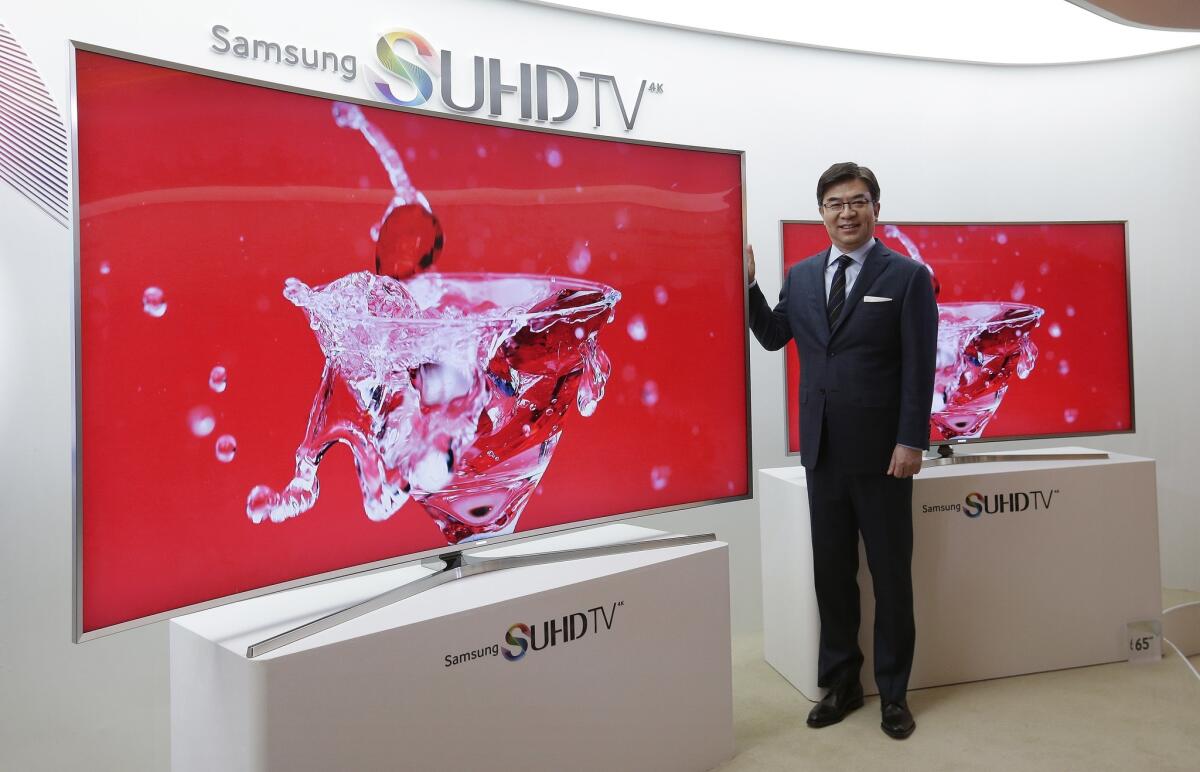Opinion: Samsung smart TVs may be listening, but they’re just not that into you

- Share via
The first big privacy scare coming out of the consumer electronics industry this year was the fear that “smart home” devices would make it easier for your data to be stolen and your behavior monitored.
Now, the Daily Beast tells us to be afraid of what we say in front of our smart TVs. And unlike the concerns about interconnected devices, which have some basis in reality, the one about eavesdropping flat screens is completely overblown.
Or, to put it another way, anyone who tells Siri or Google to search for health information or the nearest massage parlor has much more to worry about than people who chatter about their personal hygiene issues while watching “Brooklyn Nine-Nine.”
The Daily Beast’s piece triggered a slew of stories about how Samsung’s smart TVs are (in the words of a Beast headline writer) “spying on” their owners. The stories were tied to the following line in Samsung’s privacy policy: “Please be aware that if your spoken words include personal or other sensitive information, that information will be among the data captured and transmitted to a third party through your use of Voice Recognition.”
The policy (like the Beast’s story) doesn’t explain, however, how Samsung’s voice recognition works. That explanation is crucial to understanding why there isn’t really a privacy problem here.
I’m basing the following on my own experience with a Samsung smart TV from 2013 and my reading of the instructions Samsung issued late last year. Not helpfully, Samsung wasn’t fielding questions Monday about the workings of its voice-recognition technology. Instead, it put out a statement declaring that its TVs adhere to “industry-standard security safeguards and practices, including data encryption, to secure consumers’ personal information and prevent unauthorized collection or use.”
Anyway, unless Samsung changed something in its 2015 models, its TVs don’t hear anything. Instead, the listening is done by a microphone built into the remote control. And that microphone doesn’t pay attention to the sounds around it unless and until someone hits the “voice” button on the remote. Doing so causes a microphone symbol to appear on the TV screen, alerting people in the room to the fact that a giant Korean consumer electronics company’s technology is awaiting their commands.
OK, you say, but what if someone unwittingly pressed the voice button with a hip or an elbow and wasn’t paying enough attention to the TV to realize that the remote was collecting every utterance and forwarding it to an unidentified third party online? That could happen, right?
Of course it could, but it won’t unless the user takes the steps necessary to enable “voice interaction,” which employs voice-recognition technology. Otherwise, hitting the voice button will trigger a different, non-Internet-connected technology that listens for and responds to just a limited number of keywords.
The TV also reacts when the remote hears something it thinks is a command, which is another telltale sign that the remote’s mic is on. It will either display what it thinks you wanted (for example, the results of a Google search or a list of the movies being aired that evening) or tell you that it didn’t understand what you wanted.
Granted, the latter response won’t be audible if the TV is muted, and the remote will continue to listen for commands until the voice button is pressed again. But in its prepared statement, Samsung said that the only recordings the mic sends to the aforementioned third party are commands or programming searches (such as, “What channel is ‘Brooklyn Nine-Nine’ on?”). The implication is that it doesn’t pass along stray remarks (e.g., “I’m pregnant and it’s not yours,” one of the utterances CNet’s Chris Matyszczyk suggested).
Which is not to say that the information being transmitted is impersonal. Depending on what cable networks you’ve subscribed to, your searches could be revealing. And consumers may not like the idea of their viewing habits being translated into a profile that marketers could use for targeted ads.
If Samsung used your voice data for any purpose other than controlling your TV, however, it would almost certainly run afoul with the Federal Trade Commission, which requires companies to live by the disclosures they make in their privacy policies. Here, Samsung’s policy indicates that it uses a third party (most likely Nuance, based on an announcement from 2012) to provide voice-recognition services online. The only purposes disclosed in the policy are to provide the voice-recognition feature and evaluate how well it works.
That’s hardly a radical approach to voice recognition. Many such services, including Apple’s Siri and Google’s voice searches, do the voice analysis online rather than in the device.
It’s certainly true that the ever-smarter devices that surround us are gathering a lot of information about who we are and what we do. It’s also true that many people surrender this information blithely in exchange for some added convenience or utility. And the less attention the public pays to what happens to these data, the more likely they are to be used unexpectedly, and not necessarily for benign purposes.
Nevertheless, it’s important to discern the things that sound creepy from the ones that really are. Data collection for the purpose of quality control is in the former category at worst, and that appears to be all that Samsung is doing here.
Follow Healey’s intermittent Twitter feed: @jcahealey
More to Read
A cure for the common opinion
Get thought-provoking perspectives with our weekly newsletter.
You may occasionally receive promotional content from the Los Angeles Times.










